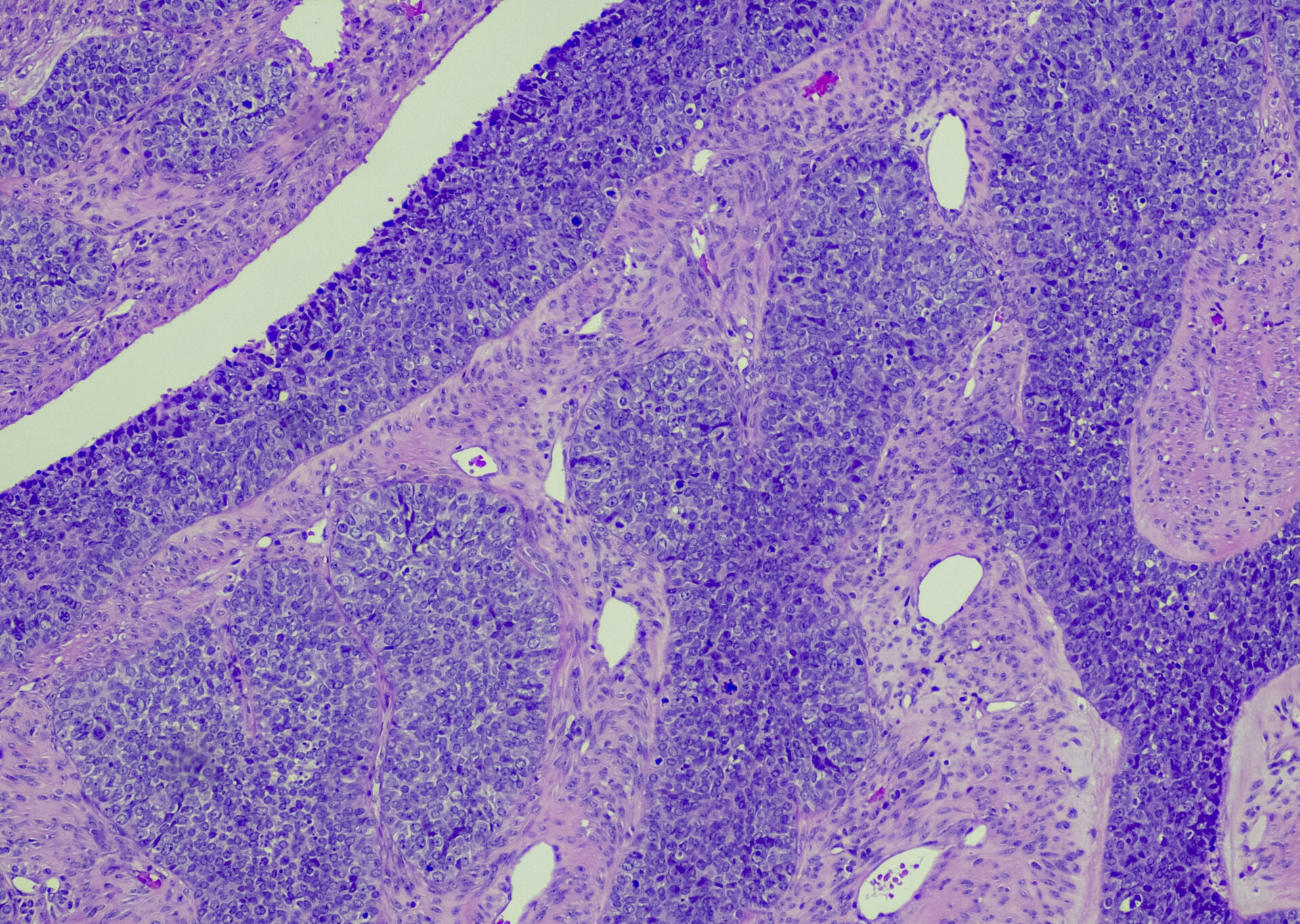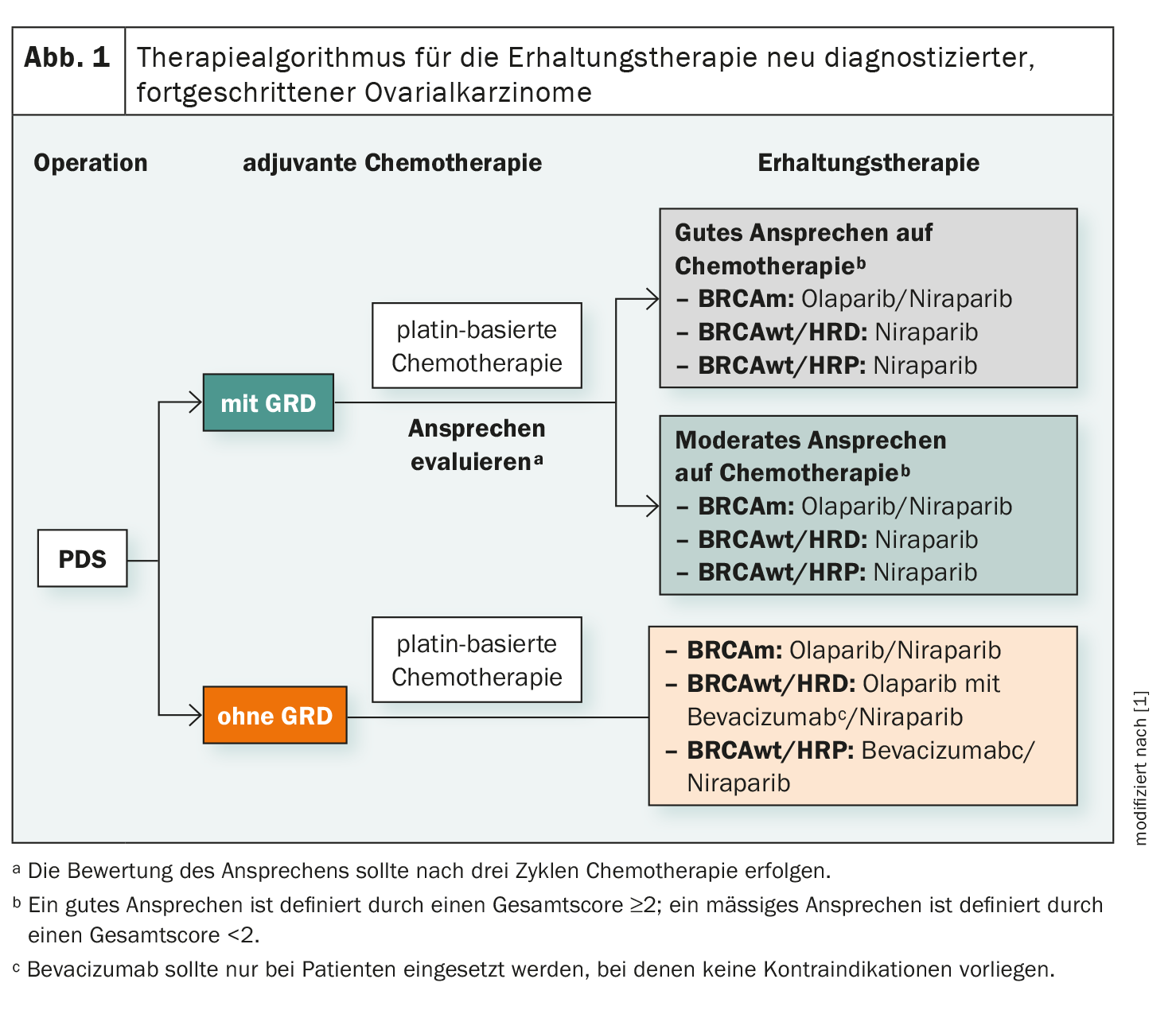The standard treatment for newly diagnosed advanced ovarian cancer consists of cytoreductive surgery followed by platinum-based chemotherapy with or without bevacizumab. Maintenance therapy with PARP inhibitors and olaparib-bevacizumab has recently been shown to significantly improve progression-free survival in first-line therapy.
Ovarian cancer (OC) was responsible for 313,959 new cases and 207,252 deaths worldwide in 2020. Late diagnosis with advanced disease partly explains the increased mortality. The standard treatment for newly diagnosed advanced OC involves cytoreductive surgery followed by platinum-based chemotherapy. Unfortunately, most patients with advanced disease relapse within three years of the primary standard treatment. The introduction of targeted therapies, including agents against the vascular endothelial growth factor (VEGF) (bevacizumab) and inhibitors of polyadenosine diphosphate (ADP)-ribose polymerase (PARP) (olaparib, niraparib), has expanded treatment options beyond chemotherapy. Recent Phase III studies investigating PARP inhibitors and the combination of olaparib-bevacizumab as maintenance therapy in newly diagnosed patients responding to platinum-based chemotherapy have shown significant benefits in terms of progression-free survival (PFS). Long-term analyses have shown that the survival benefits are persistent. While the availability of multiple treatment options is likely to improve OC management, therapeutic decisions are becoming increasingly complex for clinicians, and some practical aspects of maintenance therapy are still poorly defined. For this reason, a group of gynecologic oncologists has developed practical recommendations for the choice of maintenance therapy.
Resolving heterogeneity in treatment management
Based on the published evidence and practical experience, the scientific panel identified the following areas as relevant for the discussion of maintenance therapy:
- Use of biomarkers in clinical practice
- Surgical characteristics (timing and results)
- Selection of patients to be treated with bevacizumab
- Definition of response to treatment
- Toxicity and contraindications
- Evidence of synergistic effects with the combination of bevacizumab plus PARP inhibitor.
A modified Delphi study was conducted in order to reach a consensus on a number of statements relating to the six areas. A total of 27 statements from 22 gynecologic oncologists from all over Italy were evaluated using a 9-point scale. Consensus was defined as ≥80% agreement with a statement. The primary aim of the study was to use a Delphi method to establish a consensus on the heterogeneity of clinical practice in advanced OC and the role of key factors in decision-making for first-line maintenance therapy.
Biomarkers in everyday clinical practice
The investigation of tumor biomarkers is of crucial importance for the decision on maintenance therapy in advanced OC. The proteins encoded by BRCA1/2 are key players in homologous recombination repair (HRR), and HRR deficiency in OC caused by BRCA mutations is well characterized. BRCA mutations are the most important biomarkers for treatment planning, so BRCA status should be tested early in the treatment process. A lack of homologous recombination (HRD) is found in about 50% of high-grade OC at the time of diagnosis. HRD is defined by the presence of BRCA mutations or genomic instability, which is determined by the occurrence of loss of heterozygosity, telomeric allelic imbalance and large-scale state transitions in the genome. The HRD phenotype represents an important potential therapeutic target, as demonstrated by the high sensitivity to platinum-based chemotherapy and PARP inhibitors. The clinical significance of mutations in genes other than BRCA, which are involved in HRR, has not yet been conclusively clarified.
Type of surgery has an impact on maintenance therapy
The type of surgery performed and its results should be taken into account when choosing maintenance therapy. Studies have shown similar PFS and OS benefits for primary debulking surgery (PDS) as for neoadjuvant chemotherapy followed by interval debulking surgery (IDS).
Patient selection
Bevacizumab was the first targeted therapy to be tested for the treatment of newly diagnosed advanced OC. Based on the results of the GOG-218 and ICON-7 trials, bevacizumab in combination with carboplatin and paclitaxel, followed by maintenance therapy with bevacizumab alone, is approved for advanced OC after PDS. However, there are currently no validated biomarkers to identify patients who may benefit from bevacizumab. Preplanned subgroup analyses of the ICON-7 trial showed an overall survival benefit with the addition of bevacizumab in patients at high risk of progression (patients with stage IV, unresectable stage III or suboptimally debulked (>1 cm) stage III disease).
In the ongoing search for biomarkers for the selection of bevacizumab, the CA-125 elimination rate constant K (KELIM), a modeled kinetic parameter of CA-125 clearance during systemic therapy, is of interest as a measure of tumor chemosensitivity. A validation study on the ability of KELIM to predict the survival benefit of bevacizumab was recently conducted as part of the GOG-0218 study. The study has shown that in patients with high-risk disease, those with an unfavorable KELIM (score <1) have an advantage for survival when bevacizumab is used in addition to chemotherapy.
Pioneering therapy response
The response to platinum-containing chemotherapy could be a parameter to be considered when deciding on maintenance therapy. Efforts must therefore be made to define a “good/optimal” response to earlier chemotherapy. In patients treated with PDS, the response to chemotherapy can only be confirmed in the presence of a Gross residual disease (GRD), with the absence of radiologically detectable disease and a favorable KELIM score calculated during the first 100 days of chemotherapy indicating an optimal response to treatment. In patients treated with IDS after NACT, the response to chemotherapy should be assessed using the Chemotherapy Response Score (CRS), the KELIM score calculated during the first 100 days of chemotherapy and the completeness of resection after IDS.
Exploiting synergy effects
The combination of anti-VEGF agents with PARP inhibitors, two targeted therapies that act via different mechanisms, can enhance antitumor activity. Preclinical studies have suggested various mechanisms that may lead to synergistic effects. For example, anti-VEGF treatment has been associated with hypoxia in the tumor microenvironment, which in turn can induce HRR defects that ultimately enhance the activity of PARP inhibitors. However, there is still a lack of reliable evidence to support this statement.
Algorithm for maintenance therapy
Two types of patients with newly diagnosed advanced ovarian cancer are distinguished based on their surgical history – patients who have undergone PDS and patients who have undergone IDS followed by NACT. In both algorithms, assessment of response to chemotherapy plays a central role in the decision-making process, along with BRCA mutation status and HRD status; biomarker testing should be performed at diagnosis (Fig. 1).
Take-Home-Messages
- The risk of early disease progression, BRCA/HRD status and chemosensitivity of the tumor are important factors for the selection of maintenance therapy.
- BRCA/HRD status should be investigated in advance in patients with advanced OC with high-grade, non-mucinous histology.
- PARP inhibitors as monotherapy or in combination with bevacizumab are valuable options for patients with BRCA mutations.
- In patients without BRCA mutations, the combination of olaparib plus bevacizumab should only be used in patients with HRD-positive status; niraparib can be used regardless of biomarker status.
Source:
- Colombo N, Gadducci A, Landoni F, et al: Consensus statements and treatment algorithm to guide clinicians in the selection of maintenance therapy for patients with newly diagnosed, advanced ovarian carcinoma: Results of a Delphi study. Gynecologic Oncology 2023; 175: 182-189.
Further reading:
- You B, Pérez-Fidalgo A, Schmalfeldt B, et al: Determinants of treatment decision making regarding maintenance therapy in advanced epithelial ovarian cancer: A European Delphi study to find consensus. Poster 219. poster presented at the 24th Annual European Congress on Gynecological Oncology (ESGO), Istanbul, Turkey, September 28 – October 1, 2023.
InFo ONCOLOGY & HEMATOLOGY 2024; 12(1): 36-37












